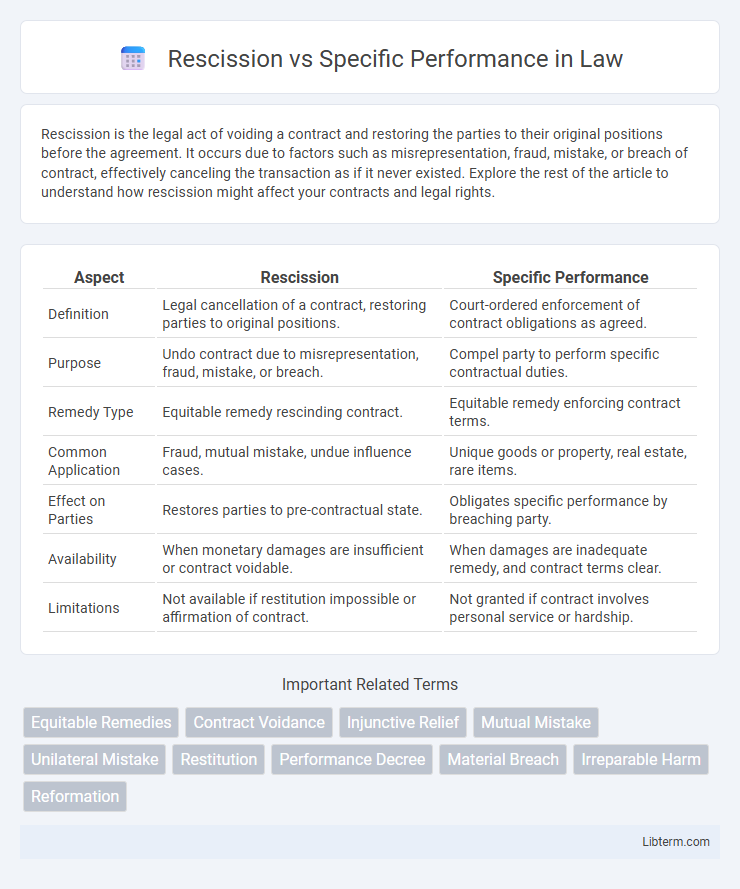Rescission is the legal act of voiding a contract and restoring the parties to their original positions before the agreement. It occurs due to factors such as misrepresentation, fraud, mistake, or breach of contract, effectively canceling the transaction as if it never existed. Explore the rest of the article to understand how rescission might affect your contracts and legal rights.
Table of Comparison
| Aspect | Rescission | Specific Performance |
|---|---|---|
| Definition | Legal cancellation of a contract, restoring parties to original positions. | Court-ordered enforcement of contract obligations as agreed. |
| Purpose | Undo contract due to misrepresentation, fraud, mistake, or breach. | Compel party to perform specific contractual duties. |
| Remedy Type | Equitable remedy rescinding contract. | Equitable remedy enforcing contract terms. |
| Common Application | Fraud, mutual mistake, undue influence cases. | Unique goods or property, real estate, rare items. |
| Effect on Parties | Restores parties to pre-contractual state. | Obligates specific performance by breaching party. |
| Availability | When monetary damages are insufficient or contract voidable. | When damages are inadequate remedy, and contract terms clear. |
| Limitations | Not available if restitution impossible or affirmation of contract. | Not granted if contract involves personal service or hardship. |
Introduction to Rescission and Specific Performance
Rescission is a legal remedy that cancels a contract, restoring the parties to their original positions as if the agreement never existed. Specific performance compels a party to fulfill their contractual obligations, typically used when monetary damages are inadequate, such as in real estate transactions. Both remedies address breach of contract but differ in their application: rescission voids the contract, while specific performance enforces its terms.
Defining Rescission in Contract Law
Rescission in contract law refers to the cancellation or annulment of a contract, effectively restoring the parties to their original positions before the agreement was made. This remedy is available when a contract is voidable due to factors such as misrepresentation, fraud, mutual mistake, or undue influence. Unlike specific performance, which compels fulfillment of contractual obligations, rescission terminates the contract to prevent unjust enrichment or harm.
Understanding Specific Performance Remedies
Specific performance remedies compel parties to fulfill their contractual obligations when monetary damages are inadequate, particularly in unique property or rare goods transactions. Courts grant specific performance primarily in real estate contracts, art sales, and bespoke manufacturing agreements, recognizing the irreplaceable nature of the subject matter. This remedy enforces actual performance rather than contract cancellation, distinguishing it from rescission, which nullifies the agreement and restores parties to their original positions.
Key Differences Between Rescission and Specific Performance
Rescission nullifies a contract, restoring parties to their pre-contractual positions, while specific performance compels fulfillment of contractual obligations as agreed. Rescission is typically granted when mutual consent is lost due to misrepresentation, fraud, or mutual mistake, whereas specific performance is an equitable remedy favored in cases involving unique goods or real estate where monetary damages are inadequate. The primary difference lies in rescission's aim to void the contract versus specific performance's goal to enforce the contract's terms.
Legal Grounds for Rescission
Legal grounds for rescission include fraud, misrepresentation, mistake, duress, undue influence, and mutual agreement to cancel a contract. Courts grant rescission when a contract is voidable due to these factors, thereby restoring parties to their original positions. Specific performance, in contrast, compels parties to fulfill contractual obligations rather than canceling the agreement.
Criteria for Granting Specific Performance
Specific performance is granted when the subject matter of the contract is unique or rare, making monetary damages inadequate for the injured party. Courts consider factors such as the feasibility of enforcement, the existence of a valid and enforceable contract, and whether the plaintiff has acted fairly and without undue delay. Unlike rescission, which cancels the contract and returns parties to their original positions, specific performance compels the exact fulfillment of contractual obligations.
Advantages and Disadvantages of Rescission
Rescission allows parties to cancel a contract and restore them to their original positions, offering a straightforward remedy for misrepresentation, fraud, or mutual mistake without enforcing ongoing obligations. This remedy provides flexibility and avoids the complexities of performance but may result in incomplete restitution if one party has already conferred benefits. The primary disadvantage is that rescission may not be feasible when substantial performance has occurred or when returning parties to their pre-contractual state is impossible, limiting its applicability in certain cases.
Pros and Cons of Specific Performance
Specific performance enforces the exact terms of a contract, ensuring unique goods or properties are delivered as agreed, which is advantageous in real estate and rare item transactions. However, it can be time-consuming and costly to enforce through courts, often requiring ongoing supervision and compliance monitoring, which may strain judicial resources. This remedy lacks flexibility, as it compels parties to fulfill obligations irrespective of changed circumstances or personal hardships, potentially leading to unfair outcomes.
Case Law Examples: Rescission vs Specific Performance
In case law, rescission is exemplified by *Sherwood v. Walker* (1887), where the contract was voided due to mutual mistake regarding the subject matter's identity. Specific performance is illustrated by *Lumley v. Wagner* (1852), compelling a singer to perform exclusively for the plaintiff, highlighting the court's power to enforce contracts when damages are insufficient. These cases demonstrate the judicial discretion in granting rescission to undo contracts or specific performance to fulfill contractual obligations.
Choosing the Right Remedy: Factors to Consider
Choosing between rescission and specific performance depends on factors such as the nature of the contract, feasibility of enforcement, and the parties' objectives. Rescission is optimal when restoring parties to their pre-contractual positions is possible and desired, especially in cases of misrepresentation or mutual mistake. Specific performance is preferable when monetary damages are inadequate, and the subject matter is unique, like real estate or rare goods, necessitating court enforcement to fulfill contractual obligations.
Rescission Infographic

 libterm.com
libterm.com